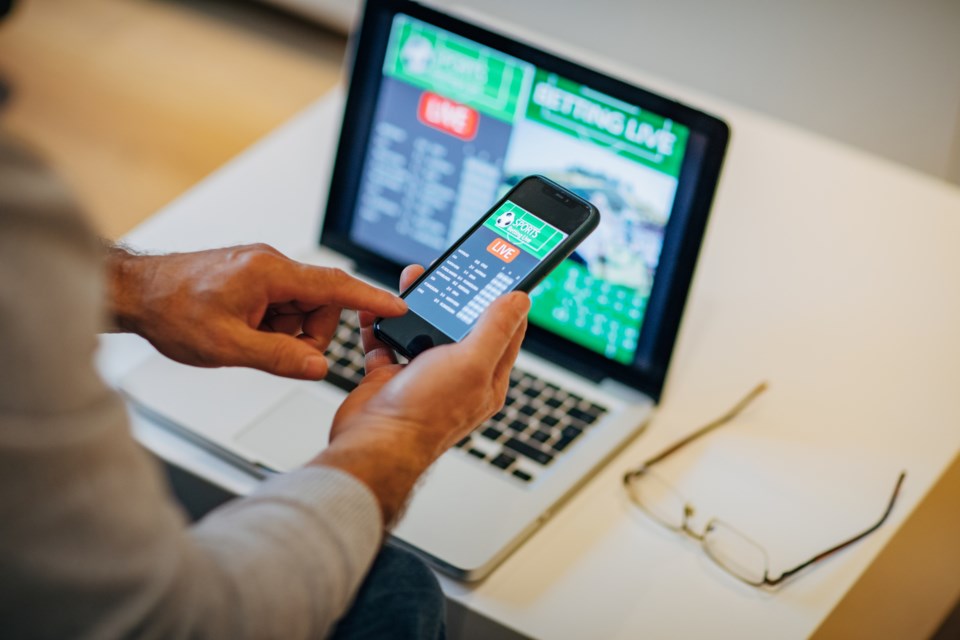On this issue I am prepared to be called a prude, a fogey and a knuckle-dragger.
I am braced to be the wet blanket.
While we’re batting around clichés, I suppose I can add that I am here to rain on the parade.
But for crying out loud, for goodness sake, what have we done to permit this sudden surge of sports betting on the pre-game, during-game and post-game programming of live hockey, basketball and baseball in recent weeks?
Why have we held back this industry for decades, only to allow it to descend with such ferocity? Why have authorities subjected us to this unbridled deluge, this emergence from the underground, this saturation of our sporting airwaves?
What happened here? Hasn’t the pandemic disrupted us enough, distracted us enough?
Where were the powerful regulators who stood firm in recent years in clamping down on cannabis when it came to letting the genie out of the bottle on gambling?
Why are we – and by that, I mean not only the private firms but our provincial governments across the country – staging incessant commercials for the legal but dangerous glorification of gambling?
Why are our broadcasters permitted to carry segments before ball games with great communicators like Cabbie touting the betting lines or star athletes like Connor McDavid of the Edmonton Oilers and Auston Matthews of the Toronto Maple Leafs or the Great One himself, Wayne Gretzky, tacitly endorsing such risk to well-being? Why are once-interesting sport highlights channels like The Score now simply some sort of bettors’ din?
Enough questions. Let’s deal with statements.The sociological literature is clear on the connection between gambling advertising and problem gambling. The medical literature is clear that the brain chemistry triggered by gambling is little different than that triggered by drugs, sex, alcohol and eating, in that the release of dopamine is evident – no matter win or lose, just playing. The inducement of the easily placed bet, often aided by introductory bonuses for newcomers, is little different than the first free drug from the dealer.
Regulators and advocates that fought industry over legitimate health concerns and kept marketing pitches from inducing minors into weed, just as they had fought to push back on alcohol and cigarettes, were toothless when the single-game betting arrived with its tentacles into our temptations.
Now in the moments before a ball game, when we’re evaluating starting lineups and the pitching matchups, we’re also getting the odds on a victory, the over-under line on runs, the chances of Vladimir Guerrero Jr. launching one into the seats – if you wish to be all-in on the telecast by moving your money into play.
Let’s not be naive. Betting probably goes back to whether Eve would eat the apple. More than US$8 billion was legally bet in America on this year’s Super Bowl. The floodgates in Canada opened when single-game betting was legalized last August.
Many intelligent people study sports to the degree they feel comfortable that gambling is not much of a gamble; with open eyes, with methods, they choose their targets with some precision and confidence.
The challenge in opening the door to a near-unfettered environment is to separate the moral question from the public health question. Through the courts and our legislatures, we have decided as a society that there is no longer any moral question to debate. The illegal practice was so rampant as to be unenforceable, except perhaps at tax time on income, so it was deemed wiser to build some structure with transparency and accountability. And if gambling dollars could pay for socially beneficial services, all the better to soothe our consciences.
Of course, illegal gambling is bound to continue, largely because of easy access to credit, the evasion of taxes and lower commissions on the bets. Organized crime isn’t folding its tent all of a sudden.
But in the way we have assembled the public environment for the practice, we have left the public health question aside. What worries me is the brazen celebration of the bet for all to see. A Harvard University study indicates the percentage of pathological gamblers and problem gamblers amounted to about 5.5 per cent of Americans. In Canada, three-quarters of us say we gamble, while an Ontario study suggests problem gamblers amount to about three per cent of them. The new environment won’t reduce that.
If I were a parent of minors, I would be concerned today to have them sit through excitable, encouraging parlance on the parlay (actually, parlays have been legal since 1985, but you get the point). The prohibition of gambling ads where children can see them ought to have been a central provision of the expansion of the industry. Britain, with a richer history of bookmaking, has such a law.
Just as with cannabis, the serious investors have staked the pole position in the gambling business. The arrival of the more casual single-game bettor – the person with the favourite team who bets on them loyally, for instance – is found money for the inveterate gambler because the returns will be better when underinformed gambles are thrown into the fray. They’re mopping up in the early going, to be sure.
This is one of the best times of the year for sports: concurrent National Hockey League and National Basketball Association playoffs and early-season Major League Baseball are, frankly, great competition for getting outdoors. This year, as a big sports fan always eager for insight and a lot of trivia I will never use profitably – not just for gambling, but also in life – the experience feels shady. I would like my attention on thinking my team, and not the house, always wins. •
Kirk LaPointe is publisher and editor-in-chief of BIV and vice-president, editorial, of Glacier Media.



